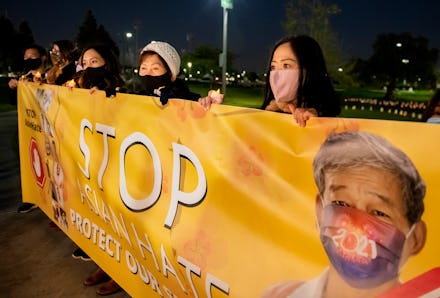Reports of anti-Asian racism have skyrocketed to nearly 4,000 in the last year alone

Racist incidents toward Asians in the United States reached appalling new heights this past year, as a new study released this week highlights the alarming rise in anti-Asian incidents — particularly ones that target women.
According to Stop AAPI Hate, the period between March 19, 2020, to Feb. 28, 2021, saw nearly 3,800 separate incidents of anti-Asian racism, with 503 cases reported to the group within 2021 alone. That number, the group explained, covers everything from verbal and physical harassment to civil rights violations and "shunning," or the deliberate avoidance of Asian Americans. The report, based on submissions reported to Stop AAPI Hate's Hate Incident tracker, shows significantly higher numbers than previously believed, with more than a thousand additional instances added to the organization's previous tally, based on "additional 2020 incidents [...] reported retroactively in 2021."
Among the study's many upsetting conclusions is an indication that Asian women in particular face the brunt of the anti-Asian biases in the United States. All told, 68% of respondents identified as women, reporting incidents at more than twice the rate of respondents who identified as men.
San Francisco State University Asian American Studies professor Russell Jeung explained to NBC News that the study indicates "an intersectional dynamic going on that others may perceive both Asians and women and Asian women as easier targets," based on a nexus of discriminatory racial and sexual vectors.
"We thought we had a lull, or it seemed like there was a lull over the summer, but I think people were just reporting less and that it became sort of normalized," Jeung, who coauthored the report, noted, urging people not to consider the new numbers as a "surge" but rather as a more accurate counting of a steady trend.
"With increased attention, I think people are reporting again," Jeung added.
Several incidents highlighted in the report center around the ongoing coronavirus pandemic, with multiple respondents citing harassment that explicitly connected their ethnicity with the virus's believed origins in China.
"I am a Pacific Islander," one respondent wrote. "I was at the mall with a friend. I was wearing a plumeria clip and was speaking Chamorro when a woman coughed and said, 'You and your people are the reason why we have corona.' She then said, 'Go sail a boat back to your island.'" Another wrote: "One of my professors was talking about the public health response to COVID-19 and explicitly called it the 'China virus' and that we've gotta be very careful about that country and what they'd do to us.'"
But Jeung, along with Karthick Ramakrishnan, the founder of the policy research organization AAPI Data, both stressed to NBC News that the whole picture of anti-Asian incidents is more complicated than simply being a byproduct of the coronavirus pandemic and the actively racist demagoguery of the Trump administration's response thereof.
"There's a complex variety of factors [in anti-Asian racism]," Ramakrishnan said. "But the fundamental reality is that there's an increase in the number of Asian Americans who feel unsafe."